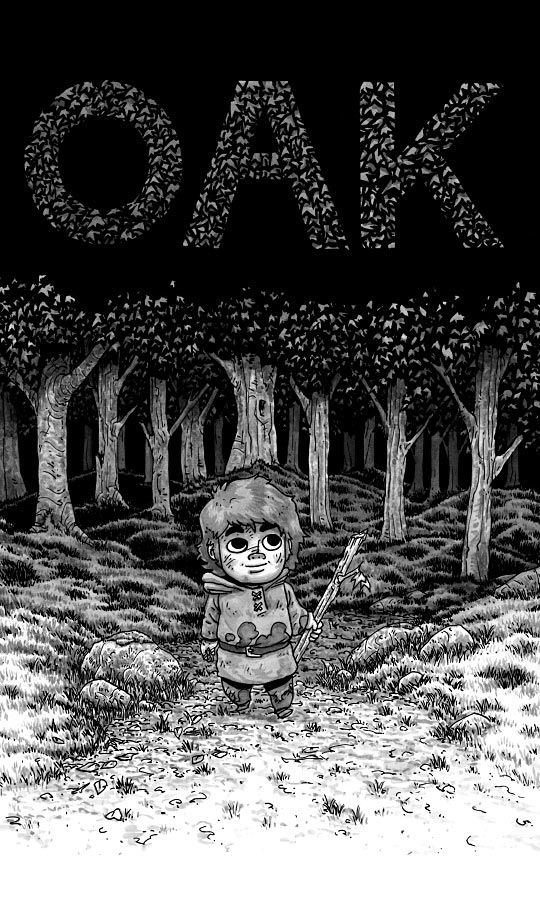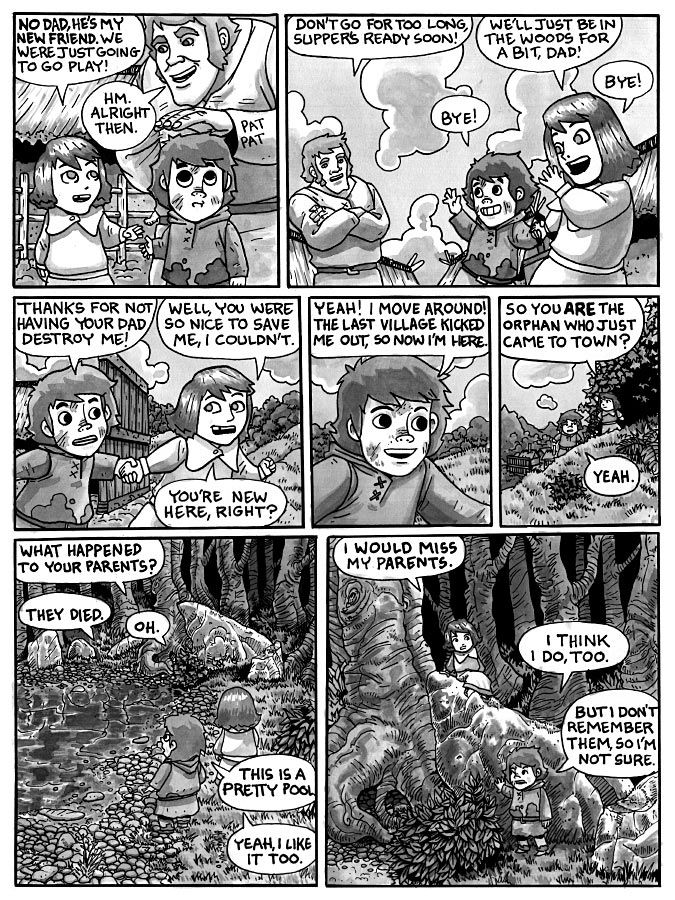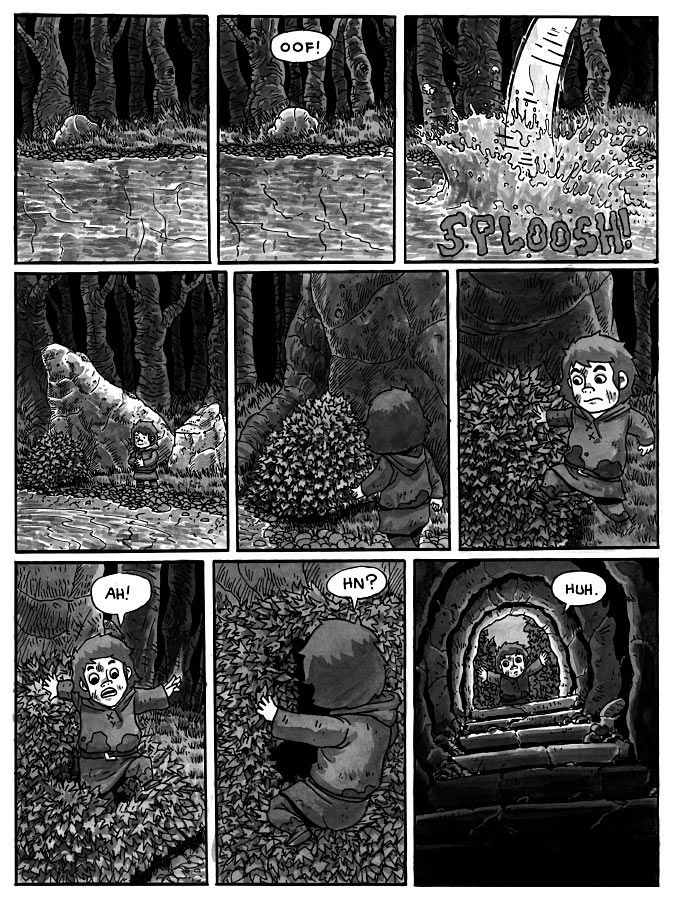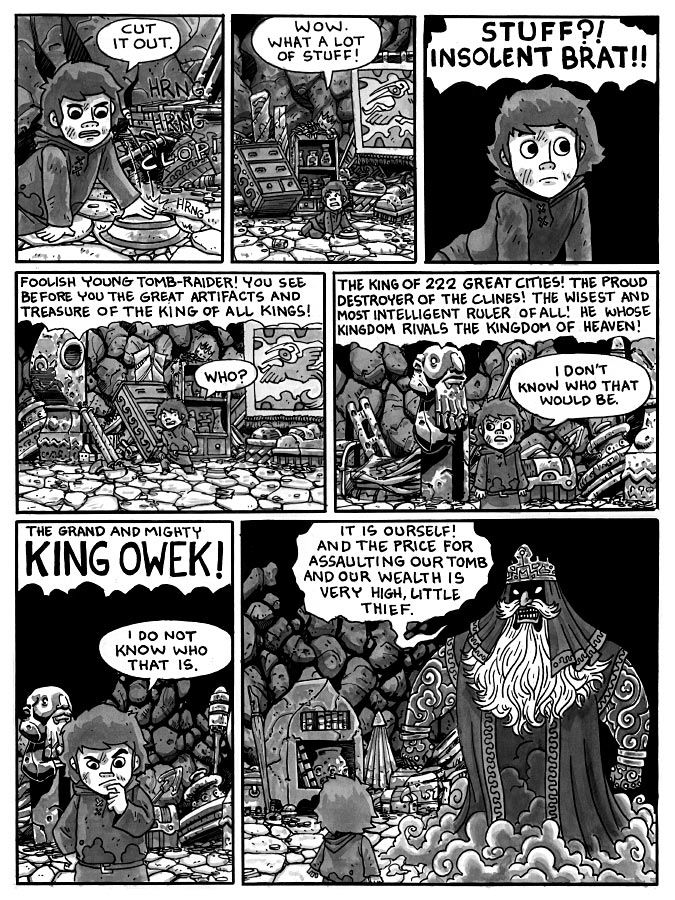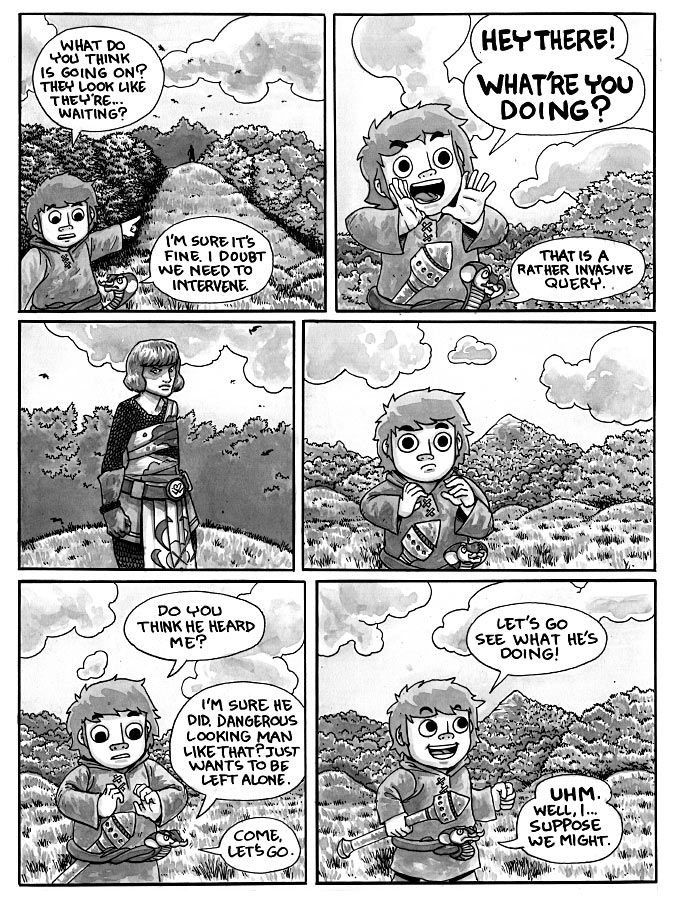Cartoonist Max Badger received one of the last Xeric Grants, which he used to publish "Oak," an all-ages fantasy tale. It's a great tale of talking trees and snakes, with masterful wordless sequences and assured storytelling, especially impressive considering the book is Badger's graphic novel debut. It's a fun and inventive story, a beautifully-designed book and an impressive first effort.
Badger spoke with CBR News about "Oak" and his upcoming webcomics project, "Sociopomp," and provided a preview of the "Oak" hardcover collection.
CBR News: Just to get things started, can you introduce yourself -- who you are, where you came from, your background in art and comics?
Max Badger: I was raised in Seattle, and I still live there. It's a great town for cartoonists, it's chock-a-block with talent. Makes me feel very fortunate to be able to take part in it, even if I personally have a fairly limited arts background. Not much formal training -- I thought about going to an arts school, but I didn't want to be saddled with the debt -- although I did take some classes at the Gage Academy Of Fine Art, a really top notch traditional arts school here. I was convinced I was going to try and make a go of it as a concept artist for video games, but I've always read comics and I decided to make that my primary focus instead. I don't really know that much about comics, oddly. I grew up reading comics from the first half of the 20th Century almost exclusively, so I'm far more in touch with the work of the early New Yorker cartoonists or Kurtzman era "MAD" than I am, say, Marvel or DC Comics.
Where did "Oak" come from?
I was casting about for things to do some years back, and I laid out a three-page intro in an afternoon, very rough. Then after having a go at making some idiotic but very fun little HTML5 and Flash games, I decided abruptly to start work on a "full-length" comic story. I revisited the three-page intro, and then as I recall I immediately got sidetracked with some other project. Then when I went back to it, I really took my time trying to write it out. I've always admired writers, and I'm a little embarrassed about my blocky, meat and potatoes crafting style for stories. I liked the idea of a German fairy tale style story focused on a young boy who had some intimate relationship with Death, but outside of that it was very free form. I think at one point it was a very predictable fantasy story where he becomes a warrior and then a king and then etc., but I grew really fond of the idea that all he really had was a good attitude, that he could sort of use that as a weapon. Like a weaponized joie de vivre. Just constant delight at the world and all it has to offer.
Did you know from the beginning that this would be an all-ages book?
I had no idea! Previous to this the longest comic I had made was a full-color five-page comic called "Oppenheimer Coffin," about an incoherent super warrior who was powered by some kind of meta-drug. All the storytelling was very incoherent and chopped up, and there was great violence and ickiness to it. I didn't realize that "Oak" was all-ages until I had it all worked out, and realized I hadn't sworn once in it. I didn't change anything to make it all-ages or shoot for that from the outset, I just tried to make it sincere. Which is for me at least one of the appealing features of fairy tales. As weird as the internal logic may seem to be, they're completely transparent to you, and I think that that sense of openness is what makes them "all-ages." I think adults are used to at least being able to tell themselves that they know what's going on around them, so you have to be a bit patronizing in "adult" storytelling by making things more immediately explicit. That sincerely presented ambiguity seems to be quite alright with kids though, I suppose because they are used to not being able to make sense of the world around them.
I love that comment about all-ages tales and storytelling. How much did knowing that the reader would have to follow the character in understanding what was happening define the story and how you approached the book?
I think exposition is a genuinely foreign element, to the real world I mean. The validity of a single static point of view taking control over the presentation of a situation is so abstract to me, and I see it as being alien to the complexity of the real world. But it's also completely familiar to anybody, as our single static perception is the basic presumed quality that grants us individuality. Giving people background information and pertinent tips to keep fresh in their mind via brief explanatory statements or outright narration is sometimes necessary to ensure a certain level of communication in a story, but I think that's best used only if you are certain that people won't be able to connect the dots without it. I think explanations are the most boring and also the most artificial element you could try and control, and the fact that they can be absolutely necessary only makes it more difficult to try and manage them.
You can also do all kinds of sneaky bait-and0switching as far as what you're explaining, and that's what I opted for. In one of the segments of "Oak," the kid comes along a sort of undead -- this knight who came back to life after being killed in a battle, missing an arm and covered in blood. I figured I could work in some kind of back story or reason or explanation or science or theology or myth or something to immediately make explicit why that came about. But in working on it, I realized that I really didn't care why it could happen -- it had happened. So the kid proceeds to ask the knight what happened, and instead of working out some complicated -- "THIS VALLEY WAS THE CRADLE OF TO-REN'DA THE UNDYING IN HIS DOTAGE, AND IT WAS FORETOLD THAT ONE SHALL BE MADE WHOLE AGAIN BY HIS WILL" -- it tells him the actual pertinent information: 'My brother betrayed me and cut me down in battle, I don't know why I'm back but I'm gonna find him and kill him.' Not that I'm against TO-REN'DA and the like -- it just seems like secondary information. Hell, later if I have cause to justify some other nonsense in the plot by bringing in TO-REN'DA, then I'm sure I will. But it's that need to get it out all in front that I object to, really. I don't think it's necessary, and it doesn't prove anything except the exact amount that you are not willing to trust the reader to bring to the table. I guess we don't give that to kids because we want them to try and prove themselves.
The brief answer is that I am opposed to wasting my time, trying to assure the reader that the justification of events in my fantasy world is a logical unity of events and systems. It doesn't matter to me what causes gravity, the important thing is the result of what falls. I guess I view it as more pragmatic storytelling.
How much of the book was created by hand as opposed to via computer?
I've had some limited success making images on the computer. There is a constant stream of beautiful work being done digitally, but I prefer the evasiveness of the physical. Pixels have a horribly/appealingly limiting quality. The book was created entirely by hand, pencils to inking to lettering to grey washes with india ink. I would've changed some of the ways I went about producing it to make getting it into book form a bit easier, but I'm a proponent of doing things by hand, overall. I do touch up on the computer, but that was necessary to get the depth of darkness I wanted.
You received a Xeric grant for the book. Why did you apply for it applied for this and what kind of difference the grant made for you?
I would not be exaggerating to say that it made all the difference for this book. I applied to it late, I didn't think my chances were very good and I was intimidated by the quality of previous recipients. But I felt compelled, and managed to get my halfway inked draft of the book in with the support of my parents and friends. I say support because in retrospect it seems clear that I had to be talked into submitting, and it was a huge boost to be able to go from finishing the book immediately into searching out printers and proceeding with production.
It's a beautiful book. How did you approach the design aspect?
Design is a weak point so I'm glad to hear that! I owe any positive impression of the book entirely to receiving a Xeric grant. I initially planned on doing a hard cover at around 8" x 10", but since the Xeric Foundation was excessively generous I was able to do the hardcover clothbound version, trying to do something in the memory of "Tintin" books and similar that were presented that way. Since the interior of the book is all watercolor ink washes, doing it in shades of grey seemed natural, and the cover and back cover were something like the fifth take on the design. I was a little bummed to find that I couldn't get the book printed in the U.S. though. You hear all that about manufacturing jobs going overseas because they're so cheap, and I was astounded to see how true that was. I would've had to charge something like $50 a book and the whole run would've cost about 5 times as much if I'd printed it here. $15 dollars for a clothbound hardcover seemed much better.
You mentioned that you were pondering what to do next and I'm curious what you're thinking about.
Here is what I am doing right now: I'm animating and collaborating on writing with my friend Carissa on an animated cartoon called "Lazy Amazing." A talkative doppelganger and a cynical cleric (and their misbegotten [Dungeons and Dragons] party troupe) who have completely great times together on adventures and also in arguments. We have a voice track and sound effects but we're going through options for the music right now. Probably due in 2014? I'm in "pre-production" of my next comic, a bi-weekly webcomic called "Sociopomp." It is a large-scale fantasy story whose primary elements are: Death, Magic, Lying, Sex, Addiction, Zen and Mysticism. I'm delighted to say that it will be fairly heavy on violence and swearing. Outside of that I am finishing a few short comics, and occasionally working piecemeal on browser games.
Oak is on sale now at www.maxbadger.com


